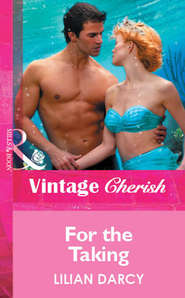По всем вопросам обращайтесь на: info@litportal.ru
(©) 2003-2025.
✖
A Marriage Worth Fighting For
Автор
Год написания книги
2019
Настройки чтения
Размер шрифта
Высота строк
Поля
In a nutshell.
She was bitterly unsurprised that he’d come out with such a catalog of material benefits, too. Of course it was the first thing he would think of, and the fault lay as much at her own door as at his. More so. The only thing that surprised her—always surprised her, in a guilty, self-doubting way—was that he seemed satisfied with his side of the bargain. What did he get out of the arrangement? There must have been hundreds of women who would have been worth more to him and who would have married him for better reasons.
This was the thing that made it impossible for her to continue their marriage.
He thought she’d married him for what he could give her. The money. The status. The pampered lifestyle. And for whatever reason, he was content with that.
Worse, when she searched her heart and searched her memories, she couldn’t find the proof to tell him he was wrong. She’d been too desperate at the time to even think about love or the deeper levels of a partnership.
She wrenched herself out of his arms, sick with shame and disappointment at herself and at him. Of course their marriage had failed. How could either of them expect any other outcome, given its flawed foundations?
“Go back to New York, MJ,” she said on a harsh whisper, while she wondered if she was a different person from that terrified twenty-three-year-old seven years ago, or if she would soon discover that she hadn’t changed at all.
Chapter Two
Seven years earlier …
“Mail,” Alicia’s boss said shortly, tossing her a handful of envelopes, which made her heart sink as soon as she saw them. “Came yesterday.”
The last time she’d moved apartments, she’d won Tony Cottini’s permission to use his restaurant address for her mail delivery, since her job seemed a more stable entity than her place of residence, but she regretted it every time these letters came.
It was so obvious what they were. Overdue account notices, containing increasingly strident demands for payment. They were cold things, echoing the cold of the November day outside.
“Thanks,” she told him quickly, then stuffed the mail in the battered purse hanging on a hook in a dingy alcove and hurried to the serving window in front of the kitchen to line four plates of hot food along her arm.
Tony wasn’t a bad boss—if he had been, maybe she wouldn’t have fallen into her current trap with the mailing address, because she wouldn’t have dared to ask—but he still had a healthy interest in her attaining maximum productivity levels at all times.
She delivered the food with a smile, took the order from the next table and skimmed back to the kitchen to slap it in front of the short-order cook, calling it out as she did so. “Three specials, two eggs over easy with bacon and hash browns, one on whole wheat, one scrambled, sausage and home fries, white toast.”
Okay, now Table Three.
It was only seven in the morning. Her feet had already begun to ache, but that would taper off after the rush hit its peak at around eleven. By the time she finished her double shift twelve hours after that, the rest of her would be so tired that the old reliable feet almost wouldn’t care.
Table Three had a doctor at it, eating by himself. She could tell he was a doctor because a) the restaurant was only a block from a major Manhattan hospital, so doctors grabbed a quick meal here quite often, b) he was reading a gigantic medical textbook and c) he’d forgotten to take off his name badge, which read Dr. Michael McKinley, Jr.
“What can I get you?” she asked him, coffeepot in hand.
At Tony’s, they didn’t bother with all that hi-my-name’s-Alicia-and-I’ll-be-your-server-today stuff. Again, he was a decent boss that way. He just growled at them every now and then, “Say whatever greeting you like to the customer. Just be sincere and say it with a smile.”
Oops, she’d forgotten the smile.
She put it on.
The one she’d practiced.
The one she’d paid for.
Or rather, borrowed the money for, at the kind of horrible interest rate you had no choice about when you had an unimpressive credit history.
The one she was, in other words, still paying for.
Dr. Michael McKinley Junior looked up from the giant book in response to her question, and his gaze arrived at her face in time to see the smile—its dutiful dawning, its practiced beauty and its slow fade when she thought about how much she still owed for these perfect straight white teeth.
He ordered the biggest breakfast on the menu and held out his cup for coffee like a thirsty man in the desert, which made her think he’d probably been working all night. She filled it neatly, to the perfect height.
There was a pride in doing good work. She’d learned that as an actress—okay, wannabe actress—and she’d always tried to carry it through into the rest of her life. Look at it this way: What if she had to play a waitress in a major movie someday? What if she was chosen to front a lifestyle TV show? Or feature in a national ad campaign for a top-selling brand of coffee? Or if a modeling photo shoot called for her to pose with a steaming cup in her hand?
Those fantasies didn’t come very often anymore. They’d been scoured away by six years of struggling to survive in Manhattan, since she’d arrived here off a bus from Tennessee at the age of seventeen. Six years of fitting acting classes and auditions around restaurant shifts. Six years of scraping together the money to eat and sleep, as well as updating her modeling portfolio and fixing her damned teeth.
She’d been told to do this by several modeling agencies, and it had seemed like an investment in her future, the one key piece of the puzzle that was missing. Once she had straight white teeth, the work would start to flow and the money would pour in.
But it still wasn’t happening, and there was this horrible slippery slope where you paid off the loan for the teeth with a credit card and then got another credit card to cover the maxed-out balance on the first one, and it was so hard to get ahead.
When did something stop being an investment and start being money poured down the drain? She hadn’t taken any of those expensive acting and voice and movement classes for a while, and her photo portfolio was more than three years old.
“You’re a beautiful girl,” she’d been told a thousand times. “But …”
Fill in the blank.
You’re two inches too short. You’re too big in the bust. You don’t have the voice. You’re too small in the bust. You don’t have the dance training. You’re a model and we’re looking for an actress. You’re an actress and we’re looking for someone who can sing … who can speak French … who can ride a unicycle … who can dance with bears while wrapping a flaming cobra around her neck and juggling ten chain saws.
Yeah, and don’t even go near the X-rated ways to complete the “someone who can” equation. This was one of her few sources of pride. She’d never stooped to porn videos or the casting couch.
But she was scared sometimes. Scared every day. She had nothing to fall back on. No close family, since Grammie’s death. Some distant cousins she didn’t even know. Friends in only a little less bad shape than she was. She could never call on them to bail her out. Most of them, she didn’t even know if they really were friends. More like fellow prisoners in the same trap. Maybe every single one of them would scramble over her dead body if it gave them a route to success. How much scrambling would she be prepared to do herself?
The desperate plans went around and around in her head. Work more double shifts so she could pay off the debt and get some money saved. Abandon her dreams of success, leave the city and find somewhere cheaper to live, take some night courses to earn a more realistic qualification.
She had nothing in that area, because she’d been so sure that the “You’re so beautiful” she’d heard since the age of nine would be enough.
There it was, right now, on Dr. Michael McKinley Junior’s face. You’re so beautiful. He didn’t say it out loud, but she’d learned to read it even when it wasn’t spoken. It was like the twenty-seven supposed Eskimo words for snow, so many variants of the same thing.
You’re so beautiful, but you’re out of my league.
You’re so beautiful, but you’re not my type.
You’re so beautiful, and I’m such a sleaze I’m not going to even hide than I’m looking down your uniform blouse.
In Dr. McKinley’s case, it seemed to be more like “You’re so beautiful, wow, you’re actually distracting me from my coffee,” and he looked so exhausted and bowled over and unaware of his own reaction that it was quite cute, because he was a good-looking man himself. Aged around thirty, she thought, with an imposing height and build, darkly even features and a warm, well-shaped mouth. So it was no hardship to meet his eye and lift the wattage of the smile a notch or two higher.
She gave him his breakfast perfectly.
And then he went, and that was that.
Or not.
Because he appeared again for supper just before she clocked off for the night, and he remembered her and told her, “You work longer hours than I do.”
“But your work is more important,” she answered, which was from-the-heart to a stupid extent, considering Dr. McKinley’s casual comment.











